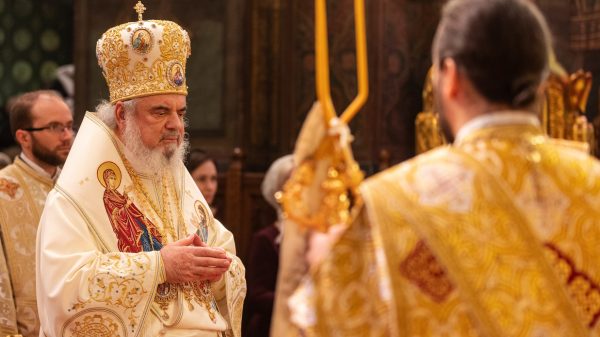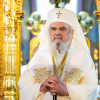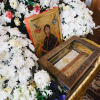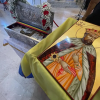On the Second Sunday of Great Lent, the Church opens before us the well-known page of the Holy Gospel about the cure of a paralytic man. This gospel passage shows us the healing power of our Saviour Jesus Christ and highlights the importance of caring for one’s health.
Referring to the four friends who made an opening in the roof of a house to take the paralytic to the Saviour, Patriarch Daniel said that they “now symbolize all doctors, nurses, charitable priests, parents, siblings, friends, neighbours or colleagues who spiritually and materially help the sick and the suffering.”
“Especially during this time, when a lot of people troubled by the new plague, the new epidemic, there is a great need for prayer and brotherly help, to strengthen their faith and to draw closer to God,” said His Beatitude Patriarch Daniel during his Sunday homily at St Gregory the Enlightener Chapel of his Patriarchal Residence.
“Even if people are urged to isolate themselves, they must transform self-isolation into more intense communion with God through prayer and meditation, thinking about the gift of life and health,” the Romanian Patriarch said March 15.
“This period shows us how fragile human life on earth is, how much need we have to keep in constant contact with God, the source of earthly life and eternal heavenly life.”
“Therefore, we must transform this period of medical crisis in a time to strengthen our faith and increase our love for God and our peers.”
His Beatitude Patriarch Daniel said that “we need to think more about how we receive power from God through repentance for our sins, through prayer, by reading spiritual writings, through a more frequent Confession and Communion, and through every good deed.”
The Patriarch recommended helping “first by prayer and then by sending material help and spiritual encouragement to those in isolation or quarantine.”
“This isolation and quarantine need not be considered as estrangement,” noted Patriarch Daniel, “but an opportunity to enhance communion, our humble love of God and our merciful love of our peers.”
“Therefore, we must pray and work not only for the health of our souls and bodies but also for the health of our fellows.”
“These rules that the authorities have imposed are aimed at preventing the transmission of the disease, and at the same time, taking care of our neighbour: not to transmit this virus and thus contribute to the deterioration of their health.”
“It is, in a paradoxical way, the time when we keep a certain distance from our neighbours for their benefit and for our own good,” His Beatitude stressed.
The Patriarch of Romania pointed out the link between sin and disease and remembered that the Saviour first healed the paralytic’s soul, by forgiving his sins, and then the body.
“Disease is sometimes the result of sin, and at other times a divine pedagogy by which man becomes humbler, and the power of God is shown as a healing and merciful power.”
The Patriarch urged that after listening to these “words of encouragement from today’s Gospel,” we would show merciful love for others.
“But this humble and merciful love comes from pure and steadfast prayer. Our love is generally selfish, possessive and passionate, but through prayer, we obtain humble and merciful love from Christ’s love,” said His Beatitude.
Concerning prayer, the Patriarch of Romania pointed to the words of St. Gregory Palamas, who explained that “prayer is not only the work of man before God, but is the work of God in the soul of man.”
“And in this spiritual work the body also participates in the fact that we kneel, do prostrations, practice fasting, self-control,” Patriarch Daniel added.
At the end of his sermon, His Beatitude Patriarch Daniel spoke about the unique qualities of Saint Gregory Palamas, calling him a “teacher of incessant prayer, a theologian of uncreated light and a great teacher of all Orthodox believers on the path of saintliness,” on the #LentenPath.
Photography courtesy of the Basilica.ro Archive / Raluca Ene

















